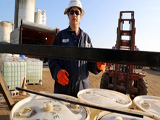Boom In Texas To Generate 20,000 New Jobs, But At A Cost
Post Views 0
It has provided the chance to convert the, now plentifully available natural gas, into resins and polymers, which are the raw materials needed for making synthetic clothing, cell phones and various other products. Along with chemical companies announcing expansion plans, more and more Texas manufactures are commencing new plants with the intention of manufacturing and marketing these products.
Experts say that they have not been witness to such expansion since a long-long time and it is on par with the petrochemical expansion in the 1980s when cheap oil was available.
Dow Chemicals, the largest chemical complex in the Western Hemisphere, is pumping in $4 billion to make it even larger. “In terms of dollars, this is the biggest expansion since we built the place,” said Earl Shipp, vice president for Dow’s Texas operations.
Environmentalists are however skeptical about the growth and say that there’ll be a heavy price to pay. They have expressed concerns and said that excessive fracturing and drilling will have a cataclysmic effect on our natural resources and assert that there will be future shortages of water and electric power statewide. The unhindered expansion will also impact the air and they except considerable air-degradation in the Houston area.
Kenneth B. Medlock III the deputy director of the Energy Forum at Rice University’s James A. Baker III Institute for Public Policy accepted that the abundance of cheap natural gas opens up many doors of opportunity for the for the petrochemical industry, “we want to be sure that as all of this activity takes off, it’s not creating a lot of bads.” He said that the “bads” to him were “water scarcity and air pollution.”
There are more petrochemical plants in Texas than anywhere else in the country. The Texas Chemical Council estimates there number to be in excess of 200. The growth can be attributed to the first big oil discovery at the beginning of the twentieth century and when the allied armies, during the Second World War, needed synthetic rubber and material for explosives.
The Texas Commission on Environmental Quality says that, in the past 16 months, eight petrochemical plant operators, including giants like Exxon, Chevron, Occidental and Mobil, have applied for air permits.
Chemical making processes have undergone a sea change and plants these days use natural gas, rather than oil, to make the chemicals. Power plants run on methane, which is constituent of natural gas, chemical plants use other, hotter-burning components — ethane, propane and butane.
Texas Chemical Council says that all proposed plants may not see the light of the day as companies are anxiously watching the fiscal turmoil in Europe and also environmentalists and lawmakers who believe in what they say, could enforce new hydraulic fracturing regulations that could adversely impact petrochemical operations.
In spite of all apprehensions, this spells a noteworthy turnaround for an industry that was lying in the pits just four years ago. Then natural gas escalated to $13 per million British Thermal units, owing to which the US lost a major share of its manufacturing to China.
Since almost half of a company’s expenses are swallowed by natural gas and energy, gas prices at current rates of less than $3 makes competing with China and others much easier and financially viable.
Chris Witte, the site manager for another expanding Freeport plant near Dow’s and owned by BASF said that the enthusiasm and the mood has improved and people within the industry are invigorated by the new atmosphere. The chemical industry has fought hard not to “go the way of the steel industry,” he said.
Dan Borne, president of the Louisiana Chemical Association said that even though most of the big companies are coming to Texas, Louisiana is not lagging far behind. “Well, I can tell you this much — we’re getting some substantial ones, too,” he said.
It is estimated that the expansions, already worth around $15 billion, will create about 20,000 jobs. Most of them will be in the construction business as the expansions will require the construction and creating of new infrastructure. However, it is assumed that around 5,000 of these jobs will be permanent jobs.
Dow Chemical’s says that there expansion plans will create 4,500 construction jobs in the coming years and 300 permanent jobs. It is worth noting that in Brazoria County, which includes the Freeport area unemployment is 7 percent and jobless residents are hopeful that they won’t remain jobless for long.
“They’re excited — ‘Oh my gosh I’m going to have a job,’ ” said Mayor Norma Garcia of Freeport.
Chemical companies say that they are keen to make certain that there will be enough skilled workers to do the work required of them – especially pipe fitters, welders and electricians. Apart from hiring new workers, posts left vacant by retiring workers also needed to be filled. Mr. Witte of BASF confirmed that around 40 percent of workers at his plant were eligible to retire over the next five years.
To ensure that there is no dearth of skilled workers BASF has sponsored programs to train skilled workers at Brazosport College in Lake Jackson.
However, the acute shortage of water is putting a question mark on the expansions. There is a crippling drought in the area which has lessened but not totally ended. Companies are adjusting to receiving less than their quota of water. Chemical plants need vast amounts of water for cooling and cleaning.
Apart from the cuts, Dow also began using cleaned-up wastewater from a nearby operation.
“We may not want to drink it, but we can certainly wash a rail car out with it,” Mr. Shipp of Dow said.
Dow’s new facilities will include a new reservoir and also innovations that will make it less water-intensive than companies using earlier technologies.
Shortage of electricity is another dampener. Even a brief loss of power can cause potentially critical disruptions at chemical plants. Many chemical plants generate electricity themselves. Dow, with his huge capacity, generates enough to manage its work independent of the grid, but other plants do not have the money muscle to follow suit.
James LeBas, a fiscal consultant to industry groups said that being big or small did not make you less or more vulnerable, “I don’t know that anyone is immune to the questions of reliability,” he said.
Environmentalists, say that the expected industrial growth will herald new levels of ozone and the quality of air is going to be negatively impacted in a big way. Matthew Tejada, executive director of Air Alliance Houston, said in an e-mail, “the next several years could be the worst for ozone in terms of adding new sources of ozone precursors since regulations began in the 1970s.”
Boom In Texas To Generate 20,000 New Jobs, But At A Cost by Harrison Barnes


 How to Make That First Job Worthwhile
How to Make That First Job Worthwhile  Get Your Own Clothing Label Started
Get Your Own Clothing Label Started  November Posts Another Strong Job Report
November Posts Another Strong Job Report  How to Succeed at a New Job
How to Succeed at a New Job  Build Your Personal Brand Before Transitioning to a New Job
Build Your Personal Brand Before Transitioning to a New Job